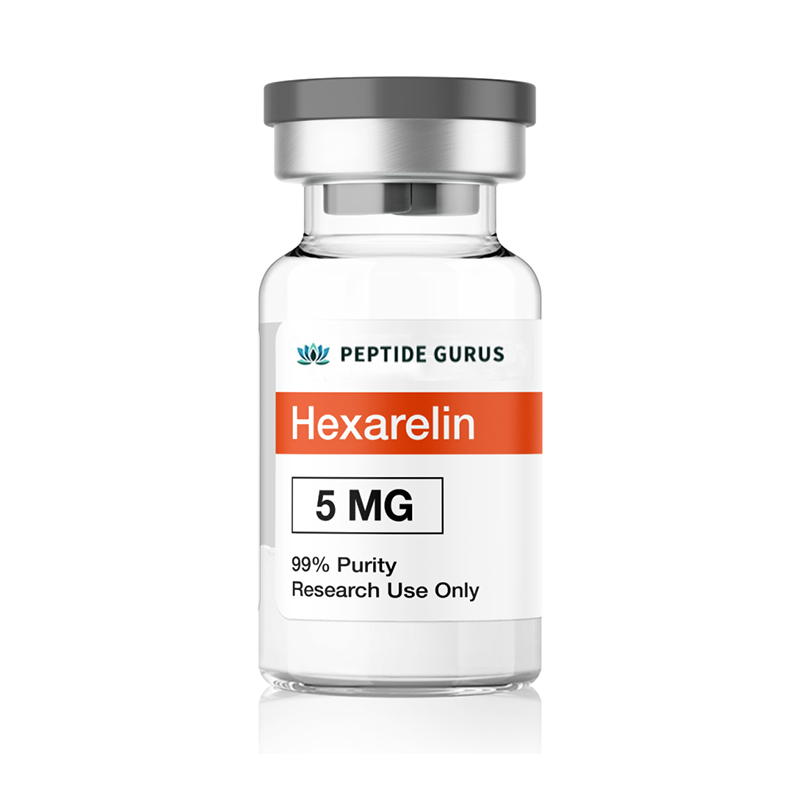



Categorieën:Peptide -eindproduct, Peptiden en hun doseringen
Gratis (1) 30 ml bacteriostatisch water
met gekwalificeerde bestellingen over$ 500 USD.
(sluit capsuleproducten, cosmetische peptiden, promotiecodes en verzending uit)
Hexarelineis een synthetisch analoog van ghrelin dat voordeel vertoont bij hartaandoeningen en hartischemie, het hart beschermt na een hartaanval. Onderzoek heeft aangetoond dat hexareline ook de skeletspier beschermt tegen verspilling en verbetert het cholesterol- en triglyceridegehalte.
Productgebruik:Dit product is alleen bedoeld als een onderzoeks chemisch.Deze aanduiding maakt het gebruik van onderzoekschemicals strikt mogelijk voor alleen in vitro testen en laboratoriumexperimentatie. Alle productinformatie die op deze website beschikbaar is, is alleen voor educatieve doeleinden. Lichamelijke introductie van welke aard dan ook in mensen of dieren is ten strengste wettelijk verboden. Dit product mag alleen worden afgehandeld door erkende, gekwalificeerde professionals. Dit product is geen medicijn, voedsel of cosmetisch en is mogelijk niet verkeerd, misbruikt of misbruikt als medicijn, voedsel of cosmetisch.
Hexarelin, ook wel examoreline genoemd, is een synthetisch analoog van ghreline en is nauw verwant aan GHRP-6. In feite verschillen hexareline en GHRP-6 slechts enigszins van elkaar dankzij de toevoeging van twee methylgroepen aan GHRP-6. Hexarelin is, net als veel ghreline -analogen, oraal en sublingueel actief en zeer selectief. Hexarelin is zwaar onderzocht naar de effecten ervan op de overleving van hartcellen na ischemie en de ontbering van voedingsstoffen.
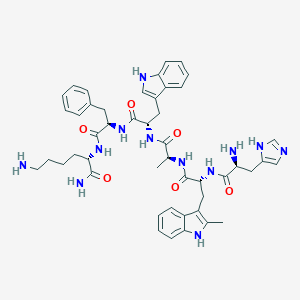
Reeks:His-D-TRP (2-me) -ala-trp-d-phe-lys
Moleculaire formule:C47H58N12O6
Molecuulgewicht:887.059 g/mol
PubChem CID:6918297
CAS -nummer:140703-51-1
Hexareline beïnvloedt direct het hart door te binden aan de CD36 -receptor en de groeihormoonsecretagogue -receptor (GHSR). Studies bij muizen suggereren dat hexareline hartcellen beschermt tegen letsel in de setting van hartaanval door binding aan deze receptoren en voorkomen dat cellen apoptose ondergaan (geprogrammeerde celdood). Muizen behandeld met hexareline in deze studie vertoonden een verbeterde hartfunctie, een verhoogd aantal overlevende hartcellen en verminderde productie van malondialdehyde (een marker van hartceldood). Interessant is dat GHRP-6 in deze studie enigszins superieur was aan ghrelin[1], [2].
A study in rats investigating the ability of GHRP-6 to offset problems associated with heart failure found that the peptide reduces oxidative stress in heart failure and prevents myocardial remodeling from taking place. Remodeling is a pathological process associated with a decline in heart function and serious morbidity. Rats treated with GHRP-6 in this study had significant improvements in the function of their heart. These processes are thought to be mediated by GHRP-6 up-regulation of phosphatase and tensin homologue (PTEN) activity as well as down regulation of protein kinase B expression[3]. PTEN plays a role in cell regeneration while protein kinase B regulates cell survival.
GHRP-6 is so effective in reducing cardiac remodeling that it shifts the balance of nervous system activity away from sympathetic stimulation (higher heart rate, higher blood pressure, etc.) toward parasympathetic dominance. This not only improves short-term health and outcomes, but reduces the need for medication over the long term and likely helps to prevent cardiac remodeling that is secondary to increased stress on the heart. Rats treated with GHRP-6 following a heart attack show substantial reductions in the size of the scar left behind[4], [5].
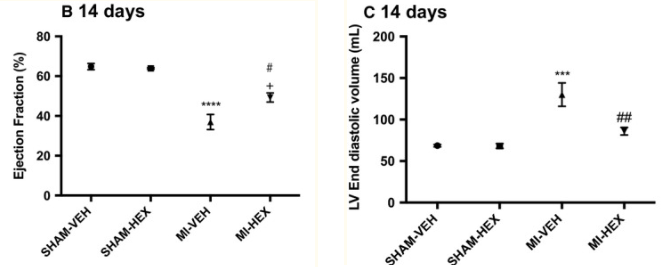
Because the mechanism by which hexarelin protects heart cells is not specific to the mechanism of damage in heart attack, researchers speculated that the peptide could be used to protect the heart from other insults as well. Research, again in rats, found that hexarelin improved cardiac function in a model of diabetes by changing the way calcium and potassium are processed by heart muscle cells[6]–[8].
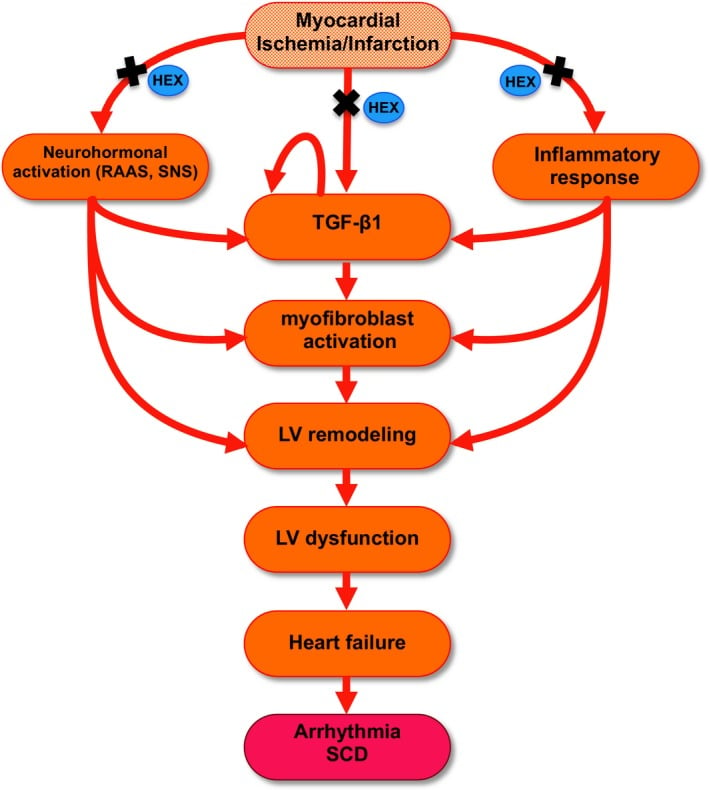
Dyslipidemia refers to an abnormal amount of fat in the blood. Interestingly, dyslipidemia is an independent risk factor for the development of diabetes, even in thin and outwardly healthy individuals. In fact, dyslipidemia may help to explain the current diabetes crisis in first-world nations and understanding its effects on human physiology is paramount to combating the growing health concerns associated with modern diets. Research in rats indicates that GHRP-6 can correct dyslipidemia in the setting of insulin resistance (the first step in the pathway to diabetes) while simultaneously lowering blood sugar and insulin resistance[9]. The peptide may offer an alternative to current lipid medications for the treatment of severe dyslipidemia.
It isn’t just heart muscle that hexarelin protects. Studies in rat models of cachexia (extreme weight loss due to illness or chemotherapy) indicate that GHRP-6 protects muscle cells by regulating calcium flow as well as mitochondrial dysfunction[10]. Mitochondria are the power plants of cells. Without them, cells cannot produce the energy they need to carry out normal function and will eventually die.
Calcium regulation is often disrupted by chemotherapy. Calcium dysregulation is one of the primary reasons that muscle mass and lean body mass are affected during cancer treatment. Research in rats indicates GHRP-6 offsets the alterations in calcium regulation caused by chemotherapy[11].
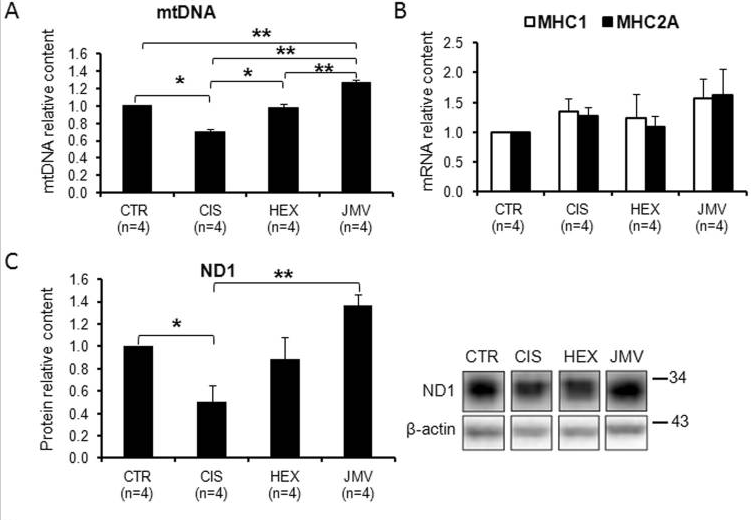
Heart disease is the leading cause of death in most developed nations. Understanding the complex process that leads to heart disease, heart failure, and eventually death is not easy, but scientists are beginning to unravel the mystery with help from peptides like hexarelin. Research utilizing hexarelin has revealed a number of new pathways for understanding the function of the heart in health and disease. It has also opened the door to develop new treatments for problems, like cardiac remodeling, that have proved difficult to treat in the past.
Hexarelin exhibits moderate side effects, low oral and excellent subcutaneous bioavailability in mice. Per kg dosage in mice does not scale to humans. Hexarelin for sale at
The above literature was researched, edited and organized by Dr. Logan, M.D. Dr. Logan holds a doctorate degree from Case Western Reserve University School of Medicine and a B.S. in molecular biology.
Aline Moulin’s research while affiliated with French National Centre for Scientific Research and other places are extensive. She is well versed in pharmaceutical development, management, external manufacturing operations, quality control, regulatory control, drug delivery, and drug discovery research. She has used Hexarelin in multiple studies to monitor if certain pharmaceuticals were capable of inhibiting many of its effects.
Aline Moulin’s is being referenced as one of the leading scientists involved in the research and development of Hexarelin. In no way is this doctor/scientist endorsing or advocating the purchase, sale, or use of this product for any reason. There is no affiliation or relationship, implied or otherwise, between
ALL ARTICLES AND PRODUCT INFORMATION PROVIDED ON THIS WEBSITE ARE FOR INFORMATONAL AND EDUCATIONAL PURPOSES ONLY.
The products offered on this website are furnished for in-vitro studies only. In-vitro studies (Latin: in glass) are performed outside of the body. These products are not medicines or drugs and have not been approved by the FDA to prevent, treat or cure any medical condition, ailment or disease. Bodily introduction of any kind into humans or animals is strictly forbidden by law.
PeptideGurus is a leading supplier of American-made research peptides, offering top-quality products at competitive prices. With a focus on excellence and customer service, they ensure a secure and convenient ordering process with global shipping.
CONTACT